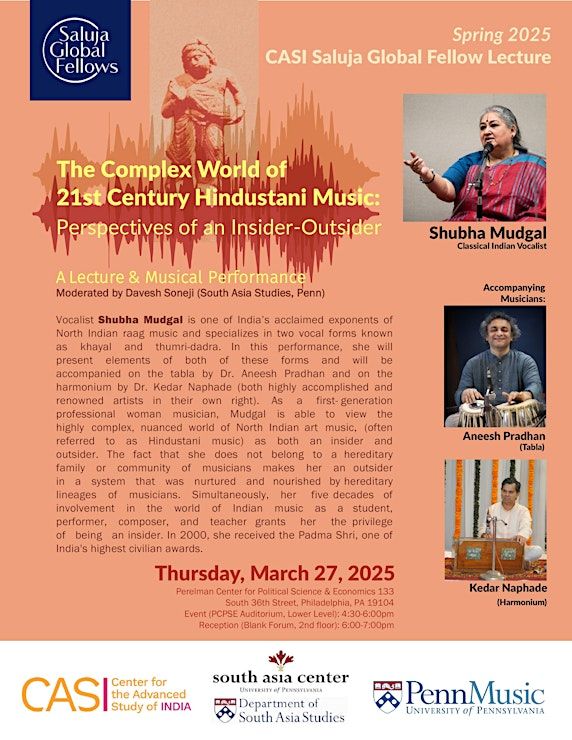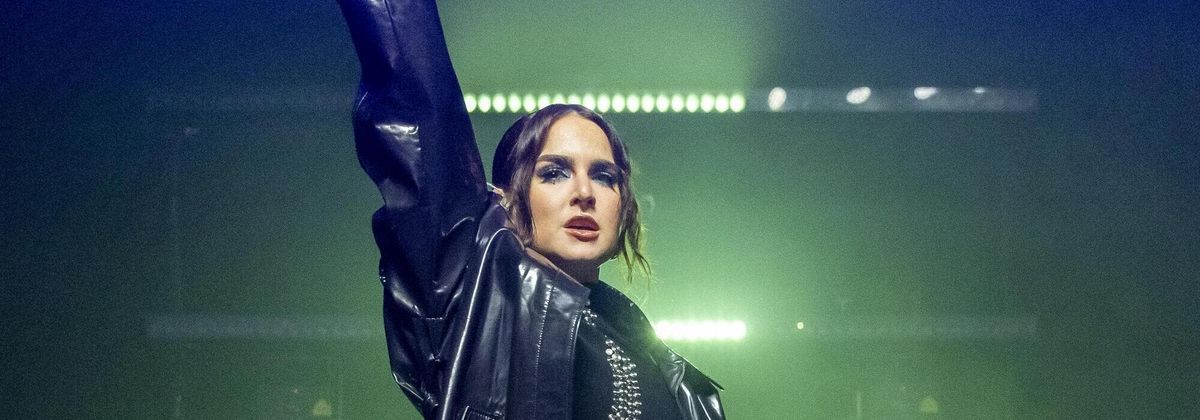
About this Event
Spring 2025 CASI Saluja Global Fellow Lecture
A Lecture & Musical Performance
Shubha Mudgal (Classical Indian Vocalist)
Aneesh Pradan (Tabla)
Kedar Naphade (Harmonium)
Moderated by Davesh Soneji (Associate Professor, South Asia Studies, Penn)
In partnership with the South Asia Center, Dept of South Asia Studies, and Penn Music
Ronald O. Perelman Center for Political Science & Economics
133 South 36th Street
Philadelphia, PA 19104
Performance (PCPSE Auditorium, Lower Level): 4:30-6:00pm
Reception (Blank Forum, 2nd floor): 6:00-7:00pm
About the Event:
In this lecture and musical performance, renowned vocalist Shubha Mudgal will provide brief illustrations of the vocal forms known as khayal and thumri-dadra, with accompaniment on the tabla by Dr. Aneesh Pradhan and on the harmonium by Dr. Kedar Naphade (both highly accomplished and renowned artists in their own right). While khayal is categorized as classical and, in a sense, more blue-blooded in its adherence to the raag and taal paradigm, thumri is commonly categorized as semi-classical and, therefore, given a lower status. The reason for this could be the close association thumri enjoyed with Kathak dance that was performed by women performers usually called courtesans or tawaifs. The stigmatized social status of these women performers relegated the thumri to a lower category in the pantheon of Hindustani musical forms.
An essentially oral tradition, Hindustani music has witnessed radical changes over the past century. But the rapidity of change that has been experienced in the last two decades, particularly due to the advances in technology, has worried connoisseurs and senior musicians. In an interaction led and moderated by Davesh Soneji (Associate Professor, South Asia Studies Dept, Penn), Mudgal and Pradhan will attempt to discuss their journeys as students of Hindustani classical music in changing circumstances that demand constant adaptation and re-orientation. The status of musical forms, instruments, and performers in modern day India will form part of the conversation, which will be interspersed with brief illustrations performed by the three artists.
About the Performers:
Vocalist is one of India’s acclaimed exponents of North Indian raag music and specializes in two vocal forms known as khayal and thumri-dadra. As a first-generation professional woman musician, Mudgal is able to view the highly complex, nuanced world of North Indian art music, (often referred to as Hindustani music) as both an insider and outsider. The fact that she does not belong to a hereditary family or community of musicians makes her an outsider in a system that was nurtured and nourished by hereditary lineages of musicians. Simultaneously, her five decades of involvement in the world of Indian music as a student, performer, composer, and teacher grants her the privilege of being an insider. In 2000, she received the Padma Shri, one of India's highest civilian awards.
Dr. Aneesh Pradhan is one of India’s leading tabla players and a disciple of the illustrious tabla maestro Nikhil Ghosh from whom he inherited a rich and varied repertoire of traditional tabla solo compositions from the Delhi, Ajrada, Lucknow, Farrukhabad and Punjab gharanas. A popular performer at most prestigious concerts and festivals in the country, Dr. Pradhan has also traveled widely and performed overseas at major events. He has also recorded prolifically for national and international record labels accompanying a host of vocalists and instrumentalists. His first tabla solo album titled “Tabla: the solo tradition” recorded in concert in 1997 and published in 2004, was followed by “Tabla solo: a continuing tradition”, a studio recording made in 2006.
Dr. Kedar Naphade received preliminary training in Hindustani Classical Music from his grandfather, Shri Dadasaheb Naphade and from Shri Arvind Gajendragadkar. Since the age of 9, he has been a disciple of the late Pt. Tulsidas Borkar, arguably the greatest harmonium player of our times. As such, like his guru Pt. Tulsidas Borkar, Dr. Naphade's music derives inspiration from the character of the traditional hindustani vocal art form, as well as the dexterous harmonium wizardry of Pt. Borkar and his guru P. Madhukar—a genius and pioneer in harmonium performance technique.
About the Moderator:
Davesh Soneji is Associate Professor in the Department of South Asia Studies at the University of Pennsylvania. He holds a Ph.D. in Religious Studies from McGill University, and his research interests lie at the intersections of social and cultural history, religion, and anthropology. For the past two decades, Prof. Soneji has produced research that focuses primarily on religion and the performing arts in South India, but also includes work on gender, class, caste, and colonialism. He is best known for his work on the social history of professional female artists in Tamil and Telugu-speaking South India and is author of Unfinished Gestures: Devadāsīs, Memory, and Modernity in South India (University of Chicago Press, 2012; Permanent Black, 2012).

Event Venue & Nearby Stays
Ronald O. Perelman Center for Political Science & Economics, 133 South 36th Street, Philadelphia, United States
USD 0.00











